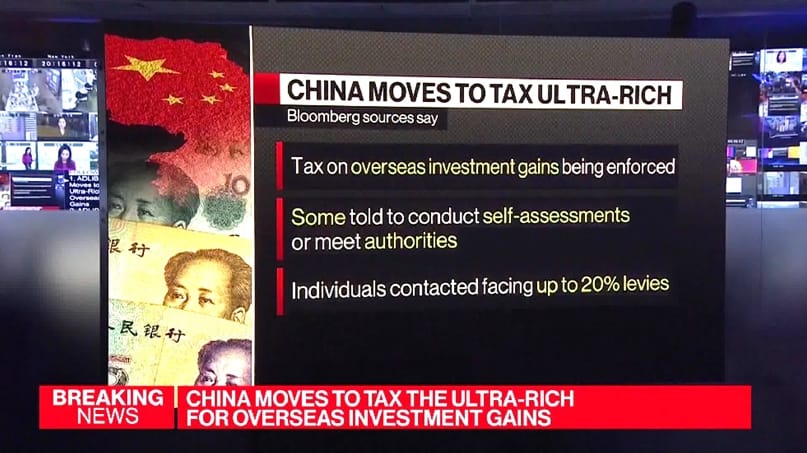彭博:中国将对超级富豪的海外投资收益征税

谷歌翻译,英文原文见本文下部分。
中国将对超级富豪的海外投资收益征税
(彭博社 2024年10月15日)——据知情人士透露,中国已开始对该国超级富豪的海外投资收益征收一项长期被忽视的税。
知情人士表示,近几个月来,中国一些大城市的富人被要求进行自我评估,或被税务机关传唤开会评估潜在的付款,包括过去几年拖欠的款项。由于讨论的是私人问题,知情人士要求匿名。
此举凸显了政府在土地销售下滑和经济增长放缓的情况下扩大收入来源的紧迫性。这也符合习近平主席的“共同富裕”运动,旨在让世界第二大经济体的财富分配更加平等。
知情人士表示,被联系的个人将面临高达 20% 的投资收益税,有些人还因逾期付款而受到罚款,并补充说最终金额是可以协商的。
中国此次的税收举措也遵循了 2018 年实施的通用报告准则,这是一个旨在防止逃税的全球信息共享系统。知情人士表示,虽然地方法规一直规定居民必须就包括投资收益在内的全球收入纳税,但直到最近才很少执行。
知情人士表示,目前尚不清楚这些努力的范围有多广,以及将持续多久。据知情人士透露,一些被针对的中国人拥有至少 1000 万美元的海外资产,而其他人则是香港和美国上市公司的股东。
中国税务局没有回应置评请求。
根据 CRS,过去六年来,中国一直在自动与近 150 个司法管辖区交换有关每个成员国纳税人账户的信息。
德勤中国副主席叶志强表示:“中国已经拥有大量 CRS 数据,税务机关可以随时挖掘这些数据,以发现征税机会。与企业税务审计相比,个人税务审计的可能性将不断上升。”
自从习近平主席发起了一场持续多年的打击行动,打击了消费互联网、金融和房地产行业以来,中国的富人一直备受关注。
2018 年,这个国家每隔几天就会诞生一位亿万富翁,这场行动削弱了最富有的人的信心。波士顿咨询集团当时估计,在中国 24 万亿美元的个人财富中,约有 1 万亿美元被存放在海外。根据联合国的数据,中国富裕公民的移民数量也大幅增加,自 2021 年以来,已有超过 120 万人离开中国。
中国 1 月至 8 月的财政收入较去年同期下降 2.6%,至约 14.8 万亿元人民币。政府土地出让收入下降 25% 至 2 万亿元,税收收入也下降了 5.3%。自 9 月底以来,决策者宣布了一系列刺激措施以重振经济,包括承诺做出多年来最大的努力来置换地方政府的表外债务,以减轻其财政负担。
地方官员在追讨公司数十年来的税收方面变得更加积极,因为他们试图填补房地产市场低迷造成的市政财政漏洞。
“展望未来,个人所得税法的执行将更加严格,”中伦律师事务所驻上海合伙人兼税务专家 Peter Ni 表示。“最终,这些高收入者的境外收入将成为税务机关的特定目标。”
英文原文
China Moves to Tax the Ultra-Rich for Overseas Investment Gains
(Bloomberg 15/10/2024) – China has begun enforcing a long-overlooked tax on overseas investment gains by the country’s ultra-rich, according to people familiar with the matter.
Some wealthy individuals in major Chinese cities were told in recent months to conduct self-assessments or summoned by tax authorities for meetings to evaluate potential payments, including those in arrears from past years, said the people, asking not to be identified discussing a private matter.
The move underscores growing urgency within the government to expand its sources of revenue as land sales tumble and growth slows. It also aligns with President Xi Jinping’s “common prosperity” campaign to create a more equal distribution of wealth in the world’s second-largest economy.
The individuals contacted are facing up to 20% levies on investment gains, and some are also subject to penalties on overdue payments, said the people, adding that the final amount is negotiable.
China’s tax push also follows its 2018 implementation the Common Reporting Standard, a global information-sharing system aimed at preventing tax evasion. While local regulations always stipulated that residents be taxed on worldwide income, including investment gains, it has rarely been enforced until recently, said the people.
It’s unclear how widespread the efforts are and how long they’ll last, the people said. Some of the targeted Chinese had at least $10 million in offshore assets, while others were shareholders of companies listed in Hong Kong and the US, according to the people.
China’s tax bureau didn’t respond to a request for comment.
Under the CRS, China has been automatically exchanging information with nearly 150 jurisdictions about accounts belonging to people subject to taxes in each member country for the past six years.
“China already has a treasure trove of CRS data which the tax authorities could readily mine to uncover collection opportunities,” said Patrick Yip, Deloitte China’s vice chair. “The potential for individual tax audits, relative to enterprise tax audits, would be on the rise.”
China’s wealthy have been under the spotlight since President Xi unleashed a multiyear crackdown that ensnared the consumer internet, finance and property sectors.
The campaign dented the confidence of the richest individuals in a country where a billionaire was being minted every few days in 2018. Boston Consulting Group estimated around the time that of the nation’s $24 trillion personal wealth, about $1 trillion was held abroad. China has also seen a spike in emigration by affluent citizens, with more than 1.2 million people leaving the country since 2021, according to United Nations data.
China’s fiscal revenue from January through August fell 2.6% from last year to about 14.8 trillion yuan. Government land sales income dropped 25% to 2 trillion yuan, while tax revenue also dipped 5.3%. Policymakers announced a swath of stimulus measures since late September to revive the economy, including pledges to make the largest effort in years to swap local governments’ off-balance sheet debt to ease their financial burden.
Local officials have become more aggressive in chasing companies for taxes dating back decades as they try to plug a hole in municipal finances caused by the housing downturn.
“Going forward, there will be stricter enforcement of the individual income tax law,” said Peter Ni, a Shanghai-based partner and tax specialist at Zhong Lun Law Firm. “Eventually offshore income of those high-income individuals will become a specific target for the tax authority.”

